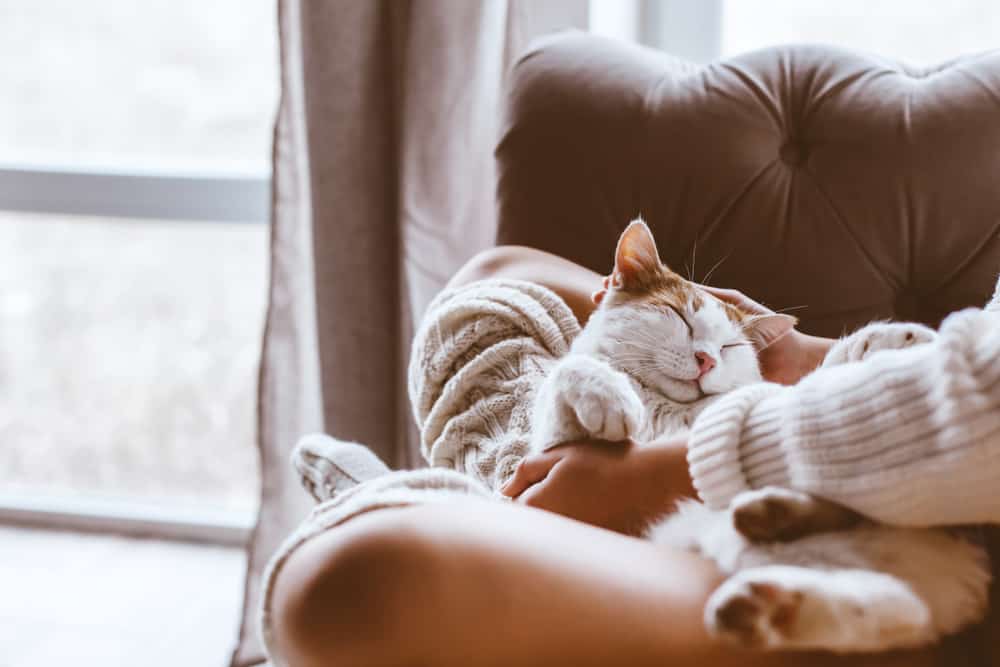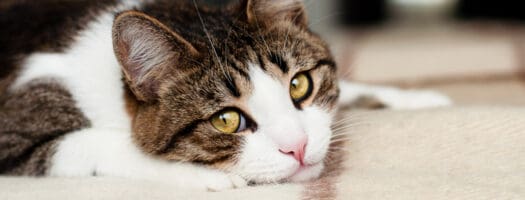How to Get Cat Pee Out of Your Couch

Although a lot of people love cats, they do have a reputation for being impulsive, vindictive little things. So when they repeatedly pee on what is probably one of the most expensive pieces of furniture that you own, it’s natural to wonder if your cat hates you.
But don’t worry, your cat doesn’t hate you. It doesn’t enjoy seeing you suffer, nor is it plotting to murder you in your sleep. Instead, it probably peed on your couch for a variety of other reasons – all of which we will discuss below.
Included in this guide are our best tips and tricks for how to get cat pee out of your couch, as well as how to ensure that your beloved kitty never soils that area again.
Best Tools to Remove Cat Pee Odor
Before we go into the actual couch cleaning process, there are some things you must know first. Not just any old cleaner can be used for this activity – you need to have the right substances to remove the odor of cat pee from your precious couch.
This section will discuss the best ‘weapons’ that you can use in your battle against that nasty smell.
Baking Soda and Vinegar
From kitchens to bathrooms, vinegar is often the first household item that people use to eliminate odors. This is because vinegar is an acid, and acids are very useful in neutralizing both the stain and smell of urine, which has an alkaline pH.
You can use one part vinegar and one part water to clean most odors, and this works especially well on walls and floors. Although vinegar has its own strong scent, most people will agree that it’s much better than cat pee. It also only takes a few hours to a few days to clear up, especially if you combine the vinegar with baking soda to neutralize its smell.
Enzyme-Based Cleaners
These types of cleaners specialize in completely removing bad odors from organic sources – the enzymes in these cleaners chemically break down the substances in cat urine that make it smell.
This is very important because cats usually come back to do their business in a place that they’ve “gone” to before. Completely removing the bad odor from your cushions, mattresses, linens, and other surfaces not only keeps them clean but also prevents your cat from going back for round two.
Ion-Based Odor Removers
Relatively new to the odor-eliminating game, ion-based odor removers like Live Pee Free!, provide complicated solutions but with impressively simple results.
This ground-breaking technology uses the interaction between positive and negative ions to remove the odor of cat urine instead of breaking down its chemical components. We don’t get it either, but it’s amazingly impressive in such simple applications – as long as you don’t mind spending a premium for one bottle.
Tip: Don’t Use Ammonia-Based Products
Because cat urine itself contains ammonia, it’s not wise to use products that contain ammonia. Cats may mistake the smell for urine, encouraging them to pee in the same spot again. Also, although ammonia is often a useful cleaner in its own right, it doesn’t react properly to cat urine and sets the stain instead of removing it.
Getting Cat Pee Out of Your Couch
Now that you’ve chosen your tools for battle, it’s finally time to learn how to get that pesky cat pee smell out of your beloved furniture.
In this example, we’ll be using a handy enzyme cleaner like the Rocco & Roxie Stain and Odor Eliminator to get rid of the smell for good.
For these steps, you’ll have to prepare:
- A couple of dry (clean) rags or towels
- A bucket of water
- Sprayer or liquid applicator
- Enzyme cleaner
Step 1: Wet the Area With Water
Spray or apply just enough water so that the affected areas are completely soaked through. If the pee is still fresh, use a towel and blot up all the cat urine as best as you can.
Step 2: Apply the Enzyme Cleaner
Soak your couch’s cushion with the enzyme cleaner. Make sure to only apply the cleaner on the area where cat pee is present, as it may harm your couch’s material if used in excess.
Step 3: Let Sit
Let the cleaning agent and water mixture sit for about 15 minutes or within the timeframe suggested by the cleaning agent’s instructions.
Step 4: Clean
Blot the area with dry towels and squeeze out as much of the enzyme cleaner as you can. You can also firmly rub the area with moist towels to dilute the remaining cleaner in your couch’s cushion.
Step 5: Dry
Once you’ve cleaned out the agent, give your couch a couple of days to dry out. If you can, place your couch outside, or in an area with good ventilation and direct/indirect sunlight.
During this period, we recommend taking measures to discourage your cat from using your cushion as a toilet for the second time. You can lay down several sheets of aluminum foil on the area where your cat previously peed or physically forbid your cat to approach the area as a training method.
Why Cats Pee on the Couch

As the old adage goes, prevention is better than cure. And to prevent the couch-peeing from happening again, a little cat psychology is in order.
In other words, it’s important to understand exactly why your cat developed this behavior in the first place.
So without further ado, here are some of the most common reasons your cat can’t seem to help but pee on your couch.
1. Lack of Training
If you’re an experienced keeper of felines, then you should know that potty training is a vital part of raising young kittens, especially if there’s no mother cat around.
However, if you’re a beginner cat owner, then it’s understandable that you may not know this at first. Kittens learn litter behavior from their mothers very early in their life, but if you have previously feral or stray rescue cats, then you have to teach them how to use a litter box. Without training, your cat may think that the whole world–your couch included–is one big bathroom.
Thankfully, cats are pretty intelligent creatures that can get accustomed to proper toilet manners quickly.
First, you will need a wide litter box filled with litter material for your cat. Make sure that your cat likes the litter. Some pets will have preferences, while others go just about anywhere. Place the litter box in a peaceful but accessible place that will make your cat feel safe and secure. Lastly, get your cat used to the litter box by putting them in it whenever you feel like they’re about to eliminate waste.
Before long, their instinct to keep clean will take over and they’ll start using the litter box automatically without your help.
2. Unappealing Litter Box
If your cat is already fully trained and still won’t use the litter box, then perhaps the problem is the box and not your cat. As naturally clean creatures, cats won’t use a litter box that smells foul, has too little litter, or is not maintained properly.
You help ensure you don’t have excessive smell or maintenance issues, keep as many litter boxes as cats you have, plus one. This means that if you have two cats, you need to have 3 litter boxes scattered around the house.
Also, consider if the litter you’re using is appealing to your cat or not. There are many kinds of litter, such as bentonite clay, tofu, silica, and even wood pellets, and your cat might just prefer one over the other. It’s best to try out a few alternatives until your pet settles on something that it feels comfortable using.
3. Stressful Events
Another reason your cats may be urinating outside of their litter box is stress. Cats, especially unneutered males, usually have the strong impulse to mark their territory as a response to situations that feel threatening or uncertain.
This is especially true if you’ve recently had a big change in your life, like moving from one house to another, getting a new pet, or even having a new baby. If this is the case, just give your cat some time to adjust; everything should go back to normal in due time.
4. Undiagnosed Illnesses
There are also medical issues that cause inappropriate urination outside the litter box. Illnesses such as kidney diseases and feline urinary tract diseases often manifest with symptoms that include sudden and irresistible bouts of urinating.
In addition to this, while kitty arthritis does not cause sudden urination, it does prevent your cat from moving comfortably. So if the litter box is located in an inaccessible place, such as at the top of the stairs, your cat may find it too arduous to go there and choose to urinate on your couch instead.
Cat Pee vs. Cat Spray
Although these actions have the same result, there are differences in how the two acts are performed. It’s important to know why they differ so that you can take measures to prevent both of them from happening when they occur.
Cat pee, as mentioned above, can be caused by lack of training, poor litter box maintenance, stress, or illness in a cat.
Cat spray is different, however. Spraying is typically used by male cats to mark territory and by females to announce that they’re ready for mating.
However, sometimes it can also result from extreme stress in a situation, like anxiety or frustration arising from insufficient playtimes, bad diet, and territorial disputes. Nevertheless, neutering or spaying your cat can minimize or even reduce these kinds of behaviors.
Why Does Cat Pee Smell?
Cat pee often goes unnoticed until it becomes so bad that it’s stinking up the whole house. This is because your cat’s urine contains urea, a foul-smelling waste product that is found in many living organisms.
When urine is exposed to open air, after a while, the bacteria in it will start to die and decompose, giving off that characteristic pee-smell that we all hate. To top it off, cat pee often has a second stage of decomposition that occurs when the dried-off pee emits mercaptans. This is the same organic chemical compound that gives skunks’ spray its smell.
And finally, cat pee also contains powerful hormones that both male and female cats use to communicate with each other.
Getting Your Cat to Stop Peeing on the Couch
As easy as those previous steps are, no pet owner wants to go through the same cleaning process over and over again, especially if it involves furniture.
So now that you have a squeaky clean couch, how do you prevent it from happening again? Here’s how.
1. Find Out Why
Time for some investigative work! As discussed above, there are a variety of reasons your pet cat could be peeing on your furniture instead of its designated litter box.
The cat may be untrained, which is often the case for recently adopted strays or newborn kittens. You may also not be paying enough attention to the condition of your pet’s litter box. It could also be because of stress, or even an undiagnosed physical illness. However, it could also not be urine at all, but rather a hormonal action called “spraying”.
You have to be patient and observe your pet’s behavior over a couple of days to determine exactly what’s keeping it from peeing in its designated place.
2. Address the Issue
Once you’ve pinned down the exact reason why your cat keeps peeing on your couch, you can remedy the issue by addressing the problem directly.
For example, if your cat is untrained, you should spend a couple of days litter training your little fuzzball. If the litter box is unkempt, always remember to keep it clean, dry, and odor-free—here’s our guide to how often cat litter should be changed.
If you believe it’s because of stress, make your cat feel safe and secure. Lastly, if you believe that it’s because of a physical condition, then get your cat to a veterinarian right away.
3. Completely Wipe Away All Traces
This is the hardest yet most important step. Cats can smell their urine, and the smell of their pee serves as a guiding beacon to their litter area. Thus, if they can smell cat pee on your couch, then there’s a high chance that they’ll pee on that same spot again – regardless if you’ve already cleaned the area.
Therefore, you have to find and eliminate all traces of cat pee. The most effective way to do this is by investing in a blacklight. A blacklight identifies cat urine if you use it in a dark room. With it, you can see even the smallest fleck of cat pee wherever it may be in your house, helping you make sure that nothing gets left uncleaned.
Getting Rid of Cat Pee
Cat pee in your furniture can be a very frustrating–and smelly–problem, and it’s normal to feel frustrated at the inability of your cat to care about your surroundings. However, keep in mind that this is not normal feline behavior, and there is often an underlying cause for behaviors like this.
Addressing the root cause will most likely solve your problem and keep it from happening again. Just have patience and determination, as this won’t be solved overnight and will probably take days, perhaps even weeks.
In the meantime – well, at least you now know how to clean cat pee from your couch!




